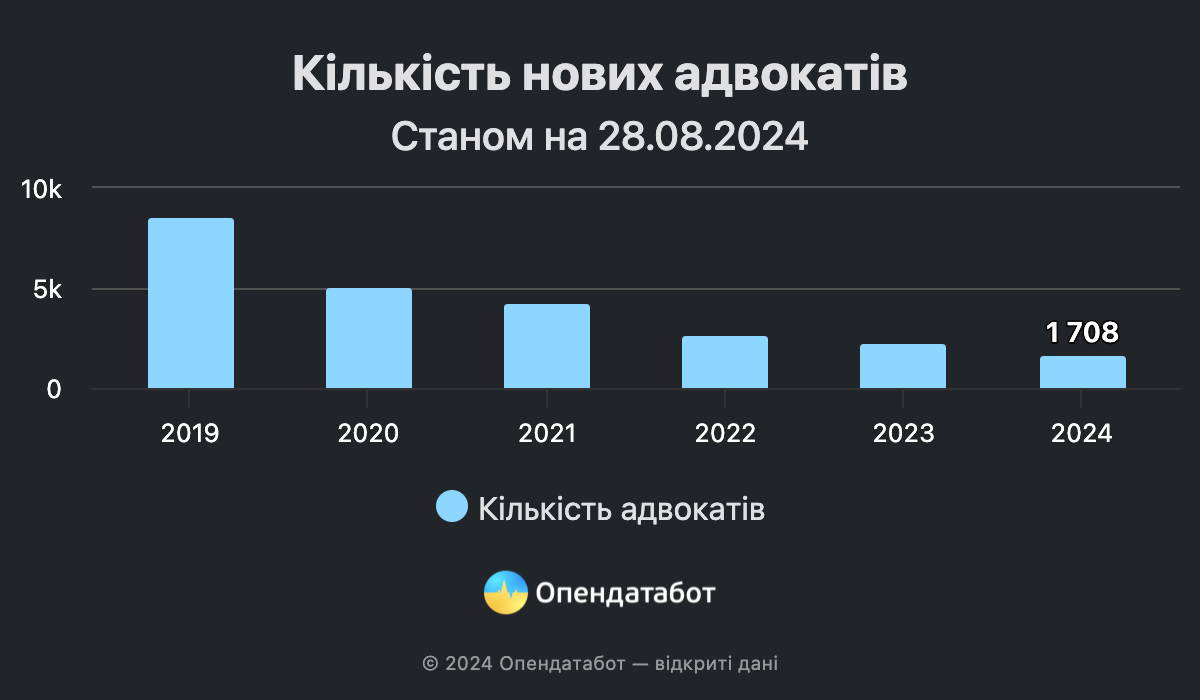
Almost 4.4 thousand new attorneys have been added to the Registry of Attorneys since the beginning of the full-scale invasion. The Registry now includes more than 53 thousand active lawyers. However, the number of new lawyers is decreasing every year. 60% of all active lawyers are men.
53,361 attorneys are currently listed in the Register of Attorneys as of the end of August 2024. Since the beginning of the full-scale invasion, the Register has been replenished with 4,370 new lawyers.
In general, the number of new lawyers is decreasing every year. While in 2020, 5,124 new lawyers were registered, this year the number is 1,708.
1,773 lawyers have temporarily suspended their activities, and 8 have stopped practicing since the beginning of the full-scale invasion.
There are more men among lawyers in Ukraine – 60% of the total number. The share of women is 40%.
Most lawyers are registered in Kyiv region – 9,127 or 17% of the total number and in Kyiv – 5,682 or 10.6%. They are followed by Dnipropetrovs’k region – 4,016 lawyers (7.5%), Odesa region – 3,992 (7.5%) and Donetsk region – 3,932 lawyers (7.4%).
The largest number of new attorneys’ licenses since the beginning of the full-scale war has been issued in Zakarpattia (+15.%), Vinnytsia (+14.6%), Odesa (+14.6%), and Rivne (+13.8%) regions.
It is worth noting that the place of issuance of the license and the actual place of work of the lawyer may differ.
As a reminder, the Register of Attorneys is available in Opendatabot, where you can find a specialist for your request. There you can easily find out about the workload and productivity of a lawyer, the categories and list of cases he or she handles.
https://opendatabot.ua/analytics/advocates-2024



The Ukrainian League of Industrialists and Entrepreneurs supports sending the draft law No. 8087 “On Amendments to Certain Laws of Ukraine on Urgent Measures to Strengthen the Capabilities of Cyber Defense of State Information Resources and Critical Information Infrastructure”, which expands the powers of the State Service for Special Communications and Information Protection and obliges private companies to have a cybersecurity officer, for a second reading.
This was stated by Anatoliy Kinakh, President of the Ukrainian Union of Industrialists and Entrepreneurs, at a public discussion of the draft law held at the USPP.
“I would very much ask that following the results of our discussion, the proposal that has absolute support in the context of returning the draft law No. 8087 for a repeated second reading for significant revision be taken into account,” Kinakh said.
He emphasized that the shortcomings in the text of the draft law do not meet European standards, especially with regard to state control in this area, the inadmissibility of monopolization of such control functions, which entails, among other things, corruption risks.
“I am confident that today we have a list of suggestions and comments compiled at a serious professional and state level. I hope that today’s hearings will also be taken into account during the regulatory procedures in the Verkhovna Rada during further consideration of the draft law,” added Kinakh.
During the discussion, experts and management of the ULIE, in particular, Vice President Ivan Petukhov, expert Igor Dyadyura and member of the Kyiv Regional Bar Council Oleg Chornobay criticized the overly broad scope of the law, unlike European counterparts that affect only medium-sized businesses.
Draft law No. 8087 also applies to any actions related to the storage of personal data or other information with limited access in digital form, and thus, according to Chornobay, even an individual lawyer who maintains a client database and stores information subject to attorney-client privilege must hire a cybersecurity specialist (officer).
“There is a beautiful title to the draft law, but when we look at the specifics, we see that it introduces changes that affect not only state information resources and not only critical infrastructure facilities, but also the private sector. Thus, the purpose of the draft law is one, but its implementation is completely different,” added Chornobay.
Petukhov noted that even a small business that maintains a database of employees or customers may also be subject to the law and incur additional costs.
According to him, the rights of businesses to appeal against unlawful orders of government agencies are also being violated. If now they do not have to comply with it, if there is an administrative appeal of the decision, then according to the draft law No. 8087, this order must be fulfilled, and then, after the fact, it can be appealed.
Vitaliy Deynega, Deputy Minister of Defense of Ukraine for Digital Development, Digital Transformation and Digitalization, also criticized the bill.
“This law may prevent us from digitizing the army and deploying digital infrastructure in the context of hostilities,” he emphasized.
Deynega noted that the Ministry should retain its independence in determining the conditions and criteria for the supply of goods, works and services for the functioning of the armed forces’ information and communication systems.
As the agency reported, draft law No. 8087 was developed by a group of MPs led by Oleksandr Fediyenko.
On January 12, it was adopted in the first reading, and the relevant committee on national security, defense and intelligence recommends its approval in the second reading.

On March 30, an appeal will be filed with the Appeals Chamber of the High Anti-Corruption Court. After that, former Boryspil Airport CEO Yevhenii Dykhne, Head of the Airport’s Lease Relations Service Olesia Levochko, and their lawyers Oleksii Nosov (Miller Law Firm) and Artem Krykun-Trush (Rostrum Law Firm) are invited to a press briefing.
On March 1, the High Anti-Corruption Court issued a guilty verdict against Yevhen Dykhne, former head of Boryspil International Airport State Enterprise, and Olesya Levochko, head of the lease agreements department.
This decision caused a great deal of resonance not only in legal circles, but also among the thinking part of society. First of all, because Yevheniy took over the airport in 2014 with a loss of UAH 500 million. Already in 2017, the airport’s profit amounted to UAH 1.7 billion.
In addition, during this period, Borspil Airport doubled its passenger traffic, doubled its budget contributions, became one of the largest taxpayers in Ukraine, and began to take the top spot in the ACI Europe airport growth ranking. This is the first court decision to convict for efficiency and activity instead of inactivity.
The only way to restore justice in this situation is to overturn the decision of the court of first instance and justify effective decisions made even under imperfect legislation.
In the case of Olesia Levochko and Yevhenii Dykhne, the HACC did not find corruption; it was not proven that they acted intentionally and jointly; neither did they prove that they pursued their own selfish interests nor the interests of third parties. They did not harm the state. Instead, they were accused of the fact that the state could have earned more if “incompetent and inefficient employees of the State Property Fund” had not acted.
Why is this decision a dangerous legal precedent for all public servants without exception?
The day before, Miller Law Firm published a legal analysis of the HACCU decision with important arguments of the defense that were not ignored in the verdict. The material is available here.
During the press briefing, the lawyers plan to present all the case materials so that all interested parties can use them as a case study.
The press conference will be held on Thursday, March 30, 2023, at 11:00 a.m. at Miller’s office at 4 Vvedenska St., office. 1, Kyiv.
Please note: Media representatives are kindly requested to register for the event by calling Miller’s PR department:
+380 (66) 024 12 94 and in any messenger convenient for you.

Lawyers in Ukraine are not ready for lawyer monopoly, it is premature for Ukraine, Vitaliy Savchuk, a lawyer and adviser to Legal Alliance has said.
“I see the lawyer monopoly premature until at least a few of these questions have been answered in the affirmative. The monopoly should be preceded by serious training for lawyers,” he told Interfax-Ukraine.
According to Savchuk, the lawyer monopoly does not guarantee that the client will receive high-quality legal services.
“When I first started working as a lawyer, I was surprised when I heard from opponents references to norms that had long ceased to be valid. “Are they more unprofessional or unethical?” I asked myself. Some of them were lawyers. The problem of the lawyer monopoly has always been more philosophical than legal,” he said.
Savchuk said that the end consumer, the client, should benefit from the reform of the defense attorneys. At the same time, the lawyer asks a number of questions, in particular, if there is a noticeable increase in the quality of the provision of legal services over the past three or four years, if the bar is effectively protecting lawyers whose rights are violated by the state, if it is really never abusing the powers of the lawyers themselves, and if it guarantees that no one cheats during the lawyer’s exam, and whether the lawyer’s exam is an actual criterion.
“Has the bar of Ukraine become such an institution with strong reputation that every lawyer wants to be a part of it? Of course, the number of lawyers has grown by double-digit percentage over the past two years preceding the introduction of the monopoly. However, it is such an incredible sudden popularity of this status that indicates that far not all lawyers sought to join the bar, they had to join it, and also that a huge percentage of lawyers did not believe in the real benefit of the lawyer’s status, and clients did not trust lawyers because of the lawyer’s certificate,” he said.
Savchuk said that despite the references of “ideologists of the lawyer monopoly in Ukraine to the Western experience,” this experience proves that “the monopoly is not the cause, but the result of many years, or even centuries of evolution of the bar as a guarantor of professionalism and protection of the rights of lawyers from state arbitrariness.”
The lawyer also expressed the opinion that the issue of lawyer monopoly can be resolved without amending the Constitution.
“Even these states, which laws are sometimes called a model, did not solve the issue of monopoly at the level of the Constitution, since for outstanding constitutions, the lawyer monopoly is a too derivative and dependent issue. This issue can be resolved by other laws,” he said.
“Of course, when changes to the Constitution are a matter of a purely parliamentary majority, not law-making technique, then school lunches can be implemented in the Constitution, but I would leave such reforms to one neighboring country,” the lawyer said.

Lawyers are waiting for the launch of a short message service (SMS) notification system for summoning parties to court hearings from March 1, provided by the Unified Judicial Information and Telecommunications System (UJITS).
Yulia Stusova, a senior lawyer at the Evris law firm, and Andiy Hradov, a junior lawyer at the same firm, told the Kyiv-based Interfax-Ukraine agency that new versions of procedural codes, which entered into force in December 2017, contain, among other things, provisions for changing the procedure for notifying participants in a lawsuit.
The main novelty of the notification system for participants in the judicial process is the gradual introduction of the UJITS, through which participants in the case and the court will be able to carry out electronic exchange of procedural documents. In addition, the court will be able to send parties orders to open proceedings and summon parties to the court session.
The lawyers said in criminal and civil proceedings, alerts to participants about court sessions will be sent via the short message service provided by mobile operators, which was first introduced in 2013. The SMS notification system will be ensured via a fixed message or summons. To use SMS alerts, there should be a written statement from a participant in the case and the court should be technically capable of handling such a notification system.
“In practice, the courts have for a long time informed the participants of the case about the court hearings by e-mail, sending decisions and summons to the addresses indicated in the documents submitted by the parties (statements of claim, comments, etc.) simultaneously with the sending of such documents by means of postal communication. Changes introduced by the new editions of the procedural codes contributed to the relevant practice,” Stusova and Hradov said.
The lawyers said existing procedural codes provide that the statement of claim and the response to the claim must necessarily contain information on the numbers of means of communication, official electronic addresses and email addresses of the parties and other participants in the case. Moreover, if such information is not specified, it becomes the reason for leaving these claims without action.
“Based on our own experience, we can say that receiving email notifications about court hearings is very convenient and saves time, which is usually spent on obtaining relevant information in court, including by telephone,” the lawyers said.
As earlier reported, the UJITS will begin operating on March 1, 2019 and will consist of the following modules: the single contact center of the judicial authority of Ukraine (its toll-free number is 0-800-501-492), a single subsystem for managing financial and business processes, the official electronic address (Electronic Cabinet), the official web portal “Judicial Power of Ukraine” (court.gov.ua), the State Register of Court Decisions, the Electronic Court subsystem, the Automated Distribution, and the Judicial Statistics module.
The UJITS was launched in the trial mode on January 1, 2019.